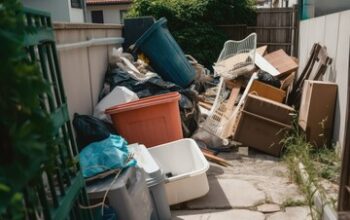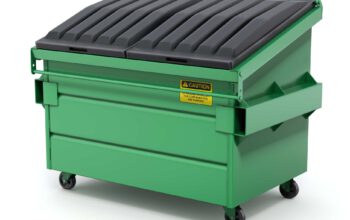Armadale Rubbish Collection prepares waste for transportation to waste recovery or disposal sites. This includes placing waste in containers, sorting it, and storing it for transport.
The waste generation rate is expected to increase with economic development and population growth. Lower middle-income countries generate more waste than high-income countries.

Environmental pollution caused by waste collection can be dangerous to humans and animals. It also causes degradation of the environment and the depletion of natural resources. There are several ways to prevent environmental pollution, including proper disposal and recycling. In addition, it is essential to understand the impacts of different types of waste. This will help in improving waste management strategies.
Most environmental pollutants produced by solid wastes come from the chemical reactions between inorganic and organic matter. These reactions produce toxic gases that pollute the air, soil, and water. They also release heavy metals, which can be harmful to living organisms. These poisonous chemicals cause various problems, such as photochemical smog, acid rain, and phytotoxicity.
In most cities worldwide, waste is collected from households and businesses daily. However, in lower-income countries, this is only done a few times a week due to a lack of funding and poor infrastructure. As a result, the waste accumulates faster than it can be processed. This makes it essential to change our habits and stop wasting.
The most common forms of environmental pollution from improper waste collection include air, water, and soil contamination. This is largely due to inadequate landfill management, contaminating drinking water and groundwater. It can also lead to the spread of diseases among people who live near landfills. Ill-managed wastes can also be a breeding ground for insects and rodents.
In the event of rainfall, contaminated landfills can dissolve inorganic and organic waste. The resulting leachate then leaks into the underground water system, which can contain high levels of toxic substances. This contaminant can also reach the lakes and rivers. The resulting water can be poisonous for fish and plants. In addition, it can cause various diseases in humans and animals. Some of these contaminants can be deadly. Some of the most toxic include mercury, cyanides, and polychlorinated biphenyls. These substances can be absorbed through the skin or eaten by animals. This can lead to several health issues, including respiratory and cardiovascular diseases.
Waste collection is a dangerous job and can cause many health issues. It exposes workers to hazardous substances that are released into the air, in particular, bioaerosols, dust, and volatile organic compounds. These chemicals can cause respiratory problems, skin irritation, and gastrointestinal symptoms. They can also affect the lungs and nervous system and may even cause cancer. The health risks of waste collection are particularly high in urban areas, with more waste disposal plants and incinerators.
The waste collection process can produce a variety of gases, including nitrogen dioxide and hydrogen sulfide. These gases are produced from microbes that decompose the organic components of the waste mass. This process releases harmful bacteria, fungi, and other organisms that can lead to various infections and chronic ailments. It is also common for people to live within two kilometers of landfills, and this has been linked to several health hazards, including low birth weight and congenital anomalies.
Workers may also be exposed to heavy metals, which are present in the incinerated ash from unsorted urban waste. Many toxic metals, such as arsenic, cadmium, and chromium, have long-term effects on the human body. They can be absorbed through the skin, or they can be inhaled or ingested.
Medical and clinical waste, such as needles, syringes, cotton, and bandages, can contain pathogenic microorganisms, which pose a health risk to workers. This type of waste also contains infectious viruses, such as hepatitis B and C, HIV, and hemorrhagic viruses.
Solid waste can also pose a health risk because it creates breeding grounds for disease-carrying pests, such as mosquitoes, cockroaches, and rats. These pests can carry diseases such as malaria and dengue fever, and they can also spread food poisoning. Proper solid waste management can prevent these organisms from lying on a large scale and causing public health problems.
In addition, chemical waste can generate toxic fumes that irritate the lungs and skin. Volatile organic compounds can contaminate these fumes and may result in dermatitis and other skin problems. It is important to use protective clothing and to clean up spills immediately.
Whether it’s recycling paper, plastic, or metal or disposing of hazardous waste, there are plenty of job opportunities in the waste management industry. But it’s important to remember that waste management specialists don’t just cart trash to a central dumpsite. They are also involved in several other duties, including developing recycling programs and managing waste facilities.
Industrialized countries and their consumers generate a significant proportion of the world’s waste. To mitigate the problem, these countries have developed a range of strategies to reduce their consumption and produce less waste. These measures include reducing packaging, using recycled products, and limiting the amount of waste they have. However, they need more resources and funding to achieve their goals.
As a result, many countries have introduced environmental taxes to discourage waste production and increase recycling rates. In addition, governments are promoting the use of alternative energy sources, which can be more environmentally friendly than fossil fuels. The best way to manage waste is by reusing and recycling as much of it as possible. However, this method has its drawbacks. It may not be as economical as dumping waste in landfills, but it is safer for the environment and less costly than purchasing new products.
Waste collectors walk around neighborhoods carrying large bags on their shoulders and ringing a bell to indicate that they are ready for residents to hand over their garbage. The collectors collect a tip for their work but are not paid a salary.
Displaced people are also employed on a cash-for-work basis to sort and process recyclable materials for sale. The scheme has been implemented in 15 municipalities and at two refugee camps, where participants receive a minimum wage for 40 days. The resulting income helps the workers’ families and reduces the burden on local councils.
Besides the jobs mentioned earlier, waste management professionals may also be responsible for supervising public works and sanitation facilities and coordinating waste collection and disposal activities. They also ensure that the facilities and plants operate safely and efficiently. In addition, they may also be involved in the management of staff.
Waste management is a complex issue that involves many different stakeholders. It requires coordination among state, local, tribal, and territorial governments; owners of private storage, treatment, and disposal facilities; residents; and other interested parties to reduce the costs associated with waste management activities. It also enhances communities’ resiliency by reducing the impact of environmental incidents and makes disaster recovery more rapid and less costly.
The waste collection costs vary with the type of waste and its handling. Some types of waste are recycled or used for energy, while others are disposed of in landfills. The most cost-effective method of waste collection is to use a waste management company that recycles as much as possible, which can save you money and improve the environment. A good waste management company will provide you with a service plan that can fit your needs. They can even provide you with skips for large volumes of rubbish.
Waste that is not managed properly can lead to air and soil pollution. This affects the surrounding community and the wildlife. Besides, overflowing trash containers can be a health and safety risk. Using a waste management service will help you stay within the law and avoid expensive fines.
Another way to reduce waste collection costs is by supporting a local business. These companies rely on you for their business, so it’s a good idea to keep them whenever possible. These businesses also employ people in the community, which is a good thing for the economy.
A waste-management service that offers volume-based pricing is one of the most cost-effective ways to reduce costs. It can be implemented in various ways, including variable pricing, unit pricing, and pay-as-you-throw. This is a cost-effective alternative to traditional fixed fees and can increase recycling rates.



